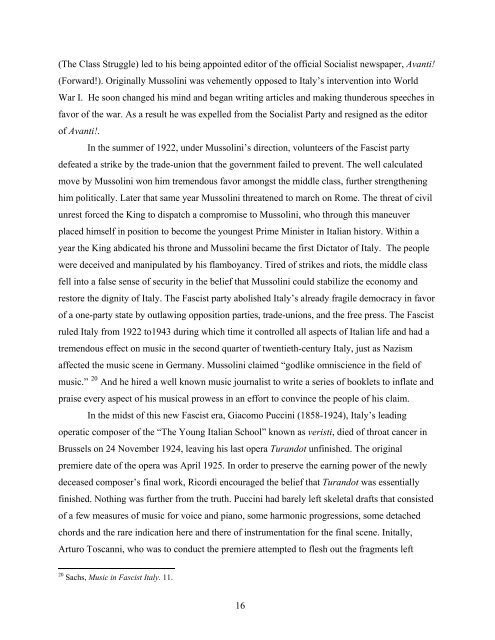Allesandro Longo complied the most complete edition of Domenico ...
Allesandro Longo complied the most complete edition of Domenico ...
Allesandro Longo complied the most complete edition of Domenico ...
You also want an ePaper? Increase the reach of your titles
YUMPU automatically turns print PDFs into web optimized ePapers that Google loves.
(The Class Struggle) led to his being appointed editor <strong>of</strong> <strong>the</strong> <strong>of</strong>ficial Socialist newspaper, Avanti!<br />
(Forward!). Originally Mussolini was vehemently opposed to Italy’s intervention into World<br />
War I. He soon changed his mind and began writing articles and making thunderous speeches in<br />
favor <strong>of</strong> <strong>the</strong> war. As a result he was expelled from <strong>the</strong> Socialist Party and resigned as <strong>the</strong> editor<br />
<strong>of</strong> Avanti!.<br />
In <strong>the</strong> summer <strong>of</strong> 1922, under Mussolini’s direction, volunteers <strong>of</strong> <strong>the</strong> Fascist party<br />
defeated a strike by <strong>the</strong> trade-union that <strong>the</strong> government failed to prevent. The well calculated<br />
move by Mussolini won him tremendous favor amongst <strong>the</strong> middle class, fur<strong>the</strong>r streng<strong>the</strong>ning<br />
him politically. Later that same year Mussolini threatened to march on Rome. The threat <strong>of</strong> civil<br />
unrest forced <strong>the</strong> King to dispatch a compromise to Mussolini, who through this maneuver<br />
placed himself in position to become <strong>the</strong> youngest Prime Minister in Italian history. Within a<br />
year <strong>the</strong> King abdicated his throne and Mussolini became <strong>the</strong> first Dictator <strong>of</strong> Italy. The people<br />
were deceived and manipulated by his flamboyancy. Tired <strong>of</strong> strikes and riots, <strong>the</strong> middle class<br />
fell into a false sense <strong>of</strong> security in <strong>the</strong> belief that Mussolini could stabilize <strong>the</strong> economy and<br />
restore <strong>the</strong> dignity <strong>of</strong> Italy. The Fascist party abolished Italy’s already fragile democracy in favor<br />
<strong>of</strong> a one-party state by outlawing opposition parties, trade-unions, and <strong>the</strong> free press. The Fascist<br />
ruled Italy from 1922 to1943 during which time it controlled all aspects <strong>of</strong> Italian life and had a<br />
tremendous effect on music in <strong>the</strong> second quarter <strong>of</strong> twentieth-century Italy, just as Nazism<br />
affected <strong>the</strong> music scene in Germany. Mussolini claimed “godlike omniscience in <strong>the</strong> field <strong>of</strong><br />
music.” 20 And he hired a well known music journalist to write a series <strong>of</strong> booklets to inflate and<br />
praise every aspect <strong>of</strong> his musical prowess in an effort to convince <strong>the</strong> people <strong>of</strong> his claim.<br />
In <strong>the</strong> midst <strong>of</strong> this new Fascist era, Giacomo Puccini (1858-1924), Italy’s leading<br />
operatic composer <strong>of</strong> <strong>the</strong> “The Young Italian School” known as veristi, died <strong>of</strong> throat cancer in<br />
Brussels on 24 November 1924, leaving his last opera Turandot unfinished. The original<br />
premiere date <strong>of</strong> <strong>the</strong> opera was April 1925. In order to preserve <strong>the</strong> earning power <strong>of</strong> <strong>the</strong> newly<br />
deceased composer’s final work, Ricordi encouraged <strong>the</strong> belief that Turandot was essentially<br />
finished. Nothing was fur<strong>the</strong>r from <strong>the</strong> truth. Puccini had barely left skeletal drafts that consisted<br />
<strong>of</strong> a few measures <strong>of</strong> music for voice and piano, some harmonic progressions, some detached<br />
chords and <strong>the</strong> rare indication here and <strong>the</strong>re <strong>of</strong> instrumentation for <strong>the</strong> final scene. Initally,<br />
Arturo Toscanni, who was to conduct <strong>the</strong> premiere attempted to flesh out <strong>the</strong> fragments left<br />
20 Sachs, Music in Fascist Italy. 11.<br />
16
















